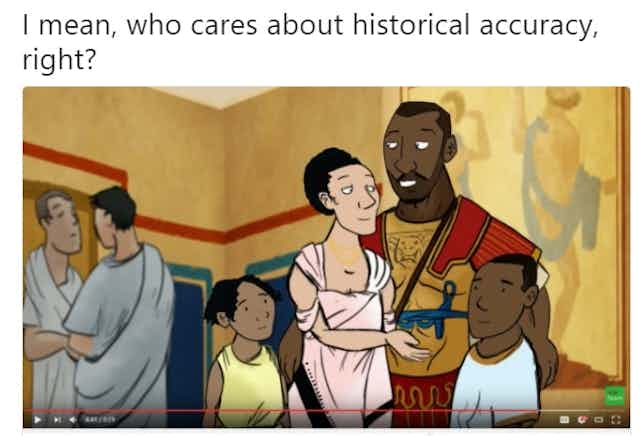Nil nimium studeo, Caesar, tibi velle placere,
nec scire utrum sis albus an ater homo.I’m not overly anxious, Caesar, to please you,
Or to know whether you’re a white or a black man.
The Roman poet Catullus, now known for the erotic verse he wrote for Lesbia and Juventius, wasn’t particularly bothered about a man’s skin pigmentation (in this particular instance, that of Julius Caesar). So why are we?
Mary Beard, professor of classics at the University of Cambridge, has recently been at the receiving end of a “torrent of aggressive insults” for suggesting that Britain under the Roman empire – which at its height stretched from northern Africa to Scotland – was ethnically diverse. The trouble started when Beard described an educational cartoon produced by the BBC, which included a black Roman solider in Britain, as “pretty accurate”.
The really interesting question here is not whether the Roman empire was ethnically diverse (it was) or even whether there were African people in the British Isles (we think there probably were) – but why it is now so important for some to establish beyond question that there was a time when Britain’s population was white and nothing else. What exactly is at stake in promoting this view of Britain’s past?
Beard’s opponents, objecting to the depiction of a black man as a high-ranking Roman soldier, have been keen to pin down exactly just how dark-skinned a member of the Roman empire living in Britain could have been. “North Africans were lightskinned,” one commentator was eager to point out. Rather than an opportunity to reflect on the languages, the literatures, the cross-cultural encounters that textured and enriched the Roman empire, some of the attacks on Beard are seemingly about negating in the strongest possible terms the presence of dark skin in British history.
The cultural and ethnic origins of the British Isles have always been subject to critical back and forth. In the 16th century, the Scottish historian Hector Boece recounted the tradition that the Scots were Egyptian in origin, descended from the princess Scota. South of the border, Raphael Holinshed (from whom Shakespeare derived so much of his material) rehearsed the tradition that Brutus, a descendent of Aeneas, prince of Troy (located in what is modern day Turkey) came to rule Britain with “a great train of the posterity of the dispersed Trojans”.
Now, faced with what is rather more persuasive evidence for multi-ethnicity in Britain’s ancient past, we are apparently no longer willing to entertain the idea that the ethnic origins of the British Isles were actually as complex as the archaeological, textual, and isotopic evidence suggests.
We might point to Quintus Lollius Urbicus, the Roman governor of Britain, who was born in Numidia (today’s Algeria) and upon whom the BBC cartoon appears to have been based. Urbicus, whose presence in Britain is recorded on an inscription at Corbridge, Northumberland, was responsible for reconquering the south of Scotland.

Then there is the evidence offered by tombstones, including that of Regina, a former slave and member of Catuvellauni, a Celtic tribe to the south, who, as her tombstone explains, married the Syrian Barates, from Palmyra (Barates Palmyrenus Natione). To this we might add the tombstone of Victor – a freedman who was buried in Britain and was “Moorish by birth” (Natione Maurum).
Scientific research has also shed new light on migration to ancient Britain. The project by Reading University, A Long Way From Home: Diaspora Communities in Roman Britain, used skeletal and isotopic remains to examine migrant communities under the empire. The team examined the chemical signatures on ancient teeth and bone to explore potential differences in diet and health between migrants and the rest of the local population.
And, of course, there were also British migrants to be found across the empire, including the centurions Titus Quintius Petrullus – whose tombstone, describing him as “from Britain”, was uncovered in Syria – and Marcus Minicius Marcellinus, who, although originally from Lincoln, was stationed in Mainz. The tomb of another Lincoln soldier, Marcus Junius Capito, has been uncovered in the old Roman province of Mauretania Caesariensis – modern-day Algeria. Migration is and has always been a two-way street.
The responses Beard has received arguably are concerned with protecting a very particular, very limiting view of the past at the expense of a genuinely enlightening debate about the Roman empire. At best, this speaks of an unwillingness to engage patiently and critically with questions which can nuance our understanding of history – and at worst, of a desire to keep the British past white.

